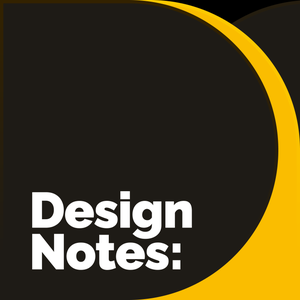
Design Notes
Liam Spradlin
- 52 minutes 7 secondsBeauty Across the Board: Rich Fulcher, UX Director
This season's special series celebrating ten years since the launch of Material Design closes out with Rich Fulcher, former Google UX director and Material design lead. Fulcher remembers the career-defining journey of creating Material, what it was like to make beauty a UX priority, how to pressure test a system, and what he’s learned about world-building across disciplines. Today, he’s creating board games, continuing to apply the design-thinking and problem-solving skills developed during his time at Google.
Leave us a rating, and subscribe so you don't miss new episodes with creative practitioners across disciplines.
14 January 2025, 8:55 am - 53 minutes 43 secondsBreaking Silos (and Metaphors): Adrian Secord, ‘Roving Engineer,’ Google
This season's special series celebrating ten years since the launch of Material Design continues with Adrian Secord, who describes himself as a “roving engineer.” Adrian has over a decade of experience building systems and tools that transform design into robust product engineering at scale. Plus, a PhD in Computer Graphics.
Here, he reflects on the evolution of Material Design and the (potentially) exciting possibilities for AI-driven UI. He shares insights on the complexities of large-scale design systems and highlights the need for designers and engineers to find common ground.
9 December 2024, 11:04 am - 43 minutes 57 secondsCode, Creativity, Performance: Will Larche, Engineering Manager, Google
This season's special series celebrating ten years since the launch of Material Design continues with Software Engineering Manager and Musical Theater Writer Will Larche, who talks about his path to become an engineering manager at Google. Larche, a self-proclaimed “design fan,” describes engineering as “creativity with constraints.” Here, he explains how the development of Material over the years has led to closer collaboration between design and engineering, and imagines how new AI experiments might open up a new era of “Star Trek design.”
21 October 2024, 10:36 am - 45 minutes 19 secondsFab Components: Bethany Fong, Design Director
This episode is part of a special series celebrating ten years of Material Design. In the episode, Liam speaks with Bethany Fong, a Design Director at Meta who was a pivotal figure in the creation of Material Design.
During her time at Google, Fong was responsible for designing the first set of Material components (including Material’s signature Floating Action Button), and went on to become a design Lead on the team.
In their conversation, Liam and Bethany talk about the tactile nature of design, the importance of keeping a notebook, and how the heady early days of Material unfolded.
👉 Read a full transcript
9 September 2024, 10:04 am - 44 minutes 42 secondsFacing Our Interfaces: Matías Duarte, Google
This season begins with a special series celebrating ten years since the launch of Material Design, which will explore the inception, evolution, and future of Google’s design approach. The first episode features the founder of Material Design and Design VP Matías Duarte, whose work on the system has pushed design forward at Google and across devices everywhere.
In their conversation, Liam and Matías unpack how interfaces are made, used, and understood—and identify opportunities to move them further into the future via a highly crafted, individualized design approach.
15 May 2024, 6:01 am - 42 minutes 8 secondsDesigning Better Code: Connie Shi + Matvei Malkov, Google Material Design
Liam speaks with Googlers Connie Shi, a software engineer on Material Design, and Matvei Malkov, a software engineer on Jetpack Compose, and the trio unpack what makes coding a creative practice, and which creative choices are required when you build a design system for other developers around the world.
The wide-ranging conversation turns from complex problem solving and technical logic to the concept of creativity as the question-provoking quality of a thought.
14 March 2023, 11:00 am - 36 minutes 57 secondsHow Fonts Change the World: Dave Crossland, Google Fonts
Liam and Google Fonts Specialist Dave Crossland explore what digital type can teach us about digital production, emotional expression, and where we fit in the world as designers; and how – with a little imagination – we might unlock new possibilities.
31 January 2023, 8:39 am - 36 minutes 46 secondsCoding (and Decoding) Social Spaces: Judith Donath, Founder, MIT Sociable Media Group
In this episode, Liam speaks with Judith Donath, the founder of MIT’s Sociable Media Lab, inventor of e-cards, and author of The Social Machine: Designs for Living Online. Donath’s work offers crucial insights into the sociality of digital products and platforms, and the opportunities we have as digital producers to make things that truly meet sociable ends. In the episode, Donath unpacks some of this work, exploring potential futures for life online and the joy of learning (and sharing) something new.
20 December 2022, 8:00 am - 28 minutes 36 secondsFearless Design: Aline Borges, The Florist
Liam speaks with Aline Borges, a Zürich-based floral designer who’s made the leap from fashion coordination for magazines like Vogue and Harper’s Bazaar to independent floral design and installations. The conversation covers what it’s like to move between different creative fields (and countries), how to think about composition to tackle almost any creative challenge, and the courage and community it takes to start on a new venture.
22 November 2022, 12:38 pm - 30 minutes 59 seconds⏮️ How Machines Help Us See Ourselves: Harvey Moon, New Media Artist
In this episode, we revisit a conversation from Season 1 with new media artist Harvey Moon, recorded in his San Francisco studio.
Liam and Harvey discuss how Moon’s work reveals unseen properties of the world around us, the process of creating one’s own creative tools, and the kind of art that’s only made possible through collaboration with machines.
The conversation expands on ideas about the way the world around us is designed and redesigned, and where that places us as designers.
Read the full transcript: https://www.iamli.am/design-notes-podcast/harvey-moon-new-media-artist
Subscribe to Design Notes:
👉RSS
25 October 2022, 4:10 pm - 44 minutes 44 secondsThe Impact of Shared Space: Ignacio Ciocchini, Public Furniture Designer
Liam speaks with streetscape and public space designer Ignacio Ciocchini, who’s created much of the public furniture that New Yorkers encounter every single day – from benches that provide personal space, to entire built landscapes for Bryant Park, to chargers for electric vehicles and more.
The conversation ranges from the materiality of the built environment, to the ways in which it expands, constrains, and informs our experiences of life and socialization in a city, with a look toward the more human-focused future that Ciocchini envisions.
Read the full transcript: https://www.iamli.am/design-notes-podcast/ignacio-ciocchini-nyc-public-furniture
Subscribe to Design Notes:
👉RSS
11 October 2022, 7:10 am - More Episodes? Get the App
Your feedback is valuable to us. Should you encounter any bugs, glitches, lack of functionality or other problems, please email us on [email protected] or join Moon.FM Telegram Group where you can talk directly to the dev team who are happy to answer any queries.
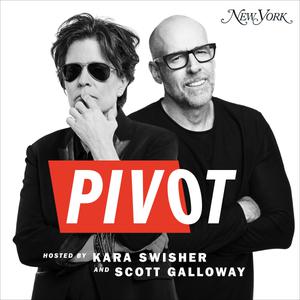 Pivot
Pivot
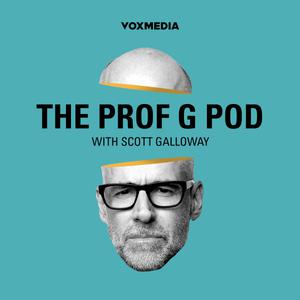 The Prof G Pod with Scott Galloway
The Prof G Pod with Scott Galloway
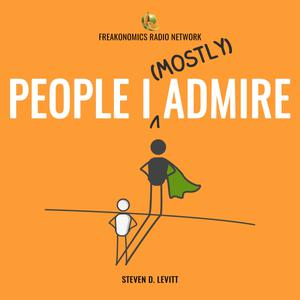 People I (Mostly) Admire
People I (Mostly) Admire
 NN/g UX Podcast
NN/g UX Podcast
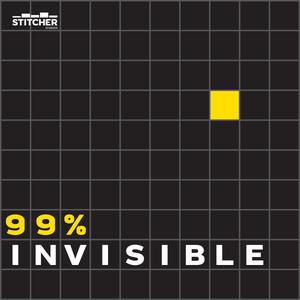 99% Invisible
99% Invisible